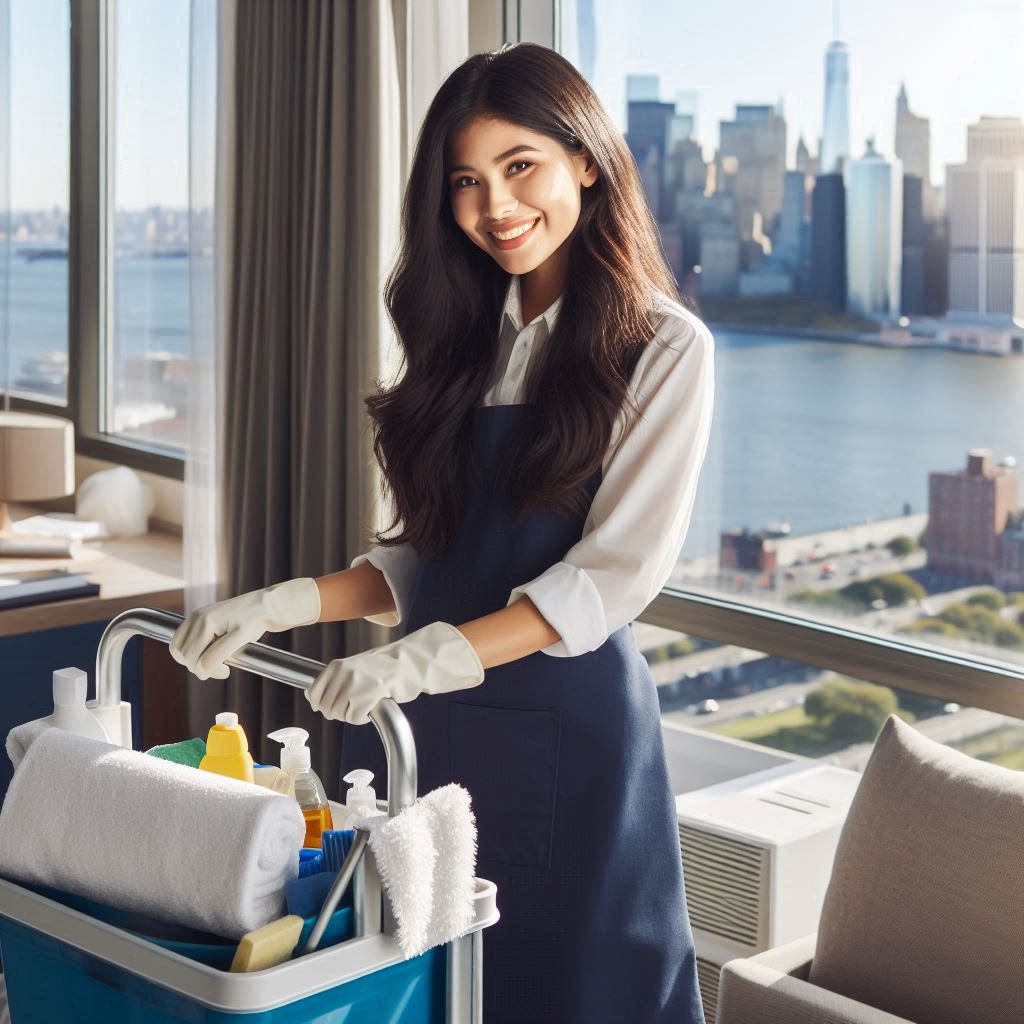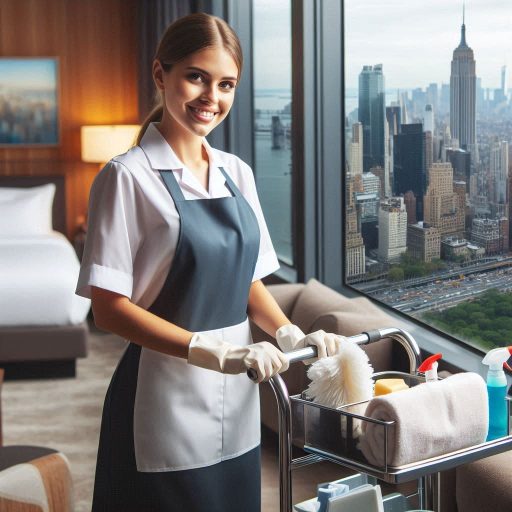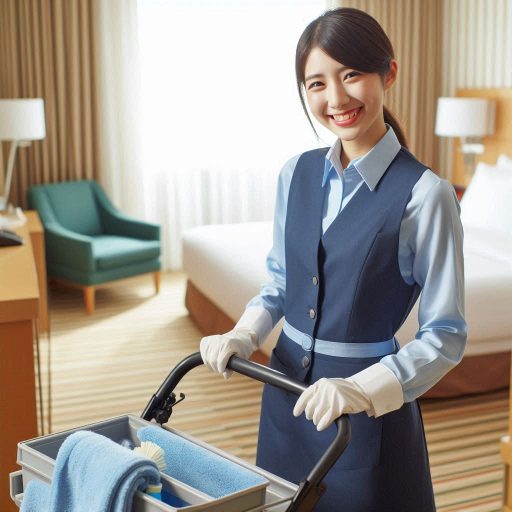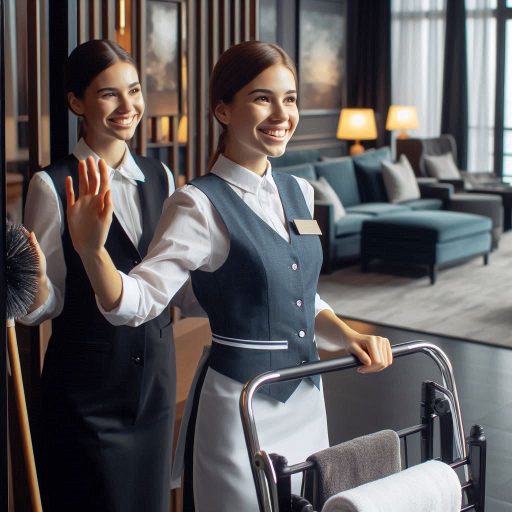Introduction
The housekeeping industry continually evolves, driven by new technologies and changing consumer expectations.
Staying updated on industry trends is crucial for housekeepers and homeowners alike.
These trends shape cleaning practices, tools, and customer service approaches.
Housekeepers must adapt to stay competitive and efficient.
They can enhance their skills and embrace innovative cleaning solutions by understanding current trends.
Homeowners benefit from this knowledge as well.
They receive better service and more effective cleaning methods tailored to their needs.
Recent trends include the rise of eco-friendly cleaning products, which promote sustainability and health.
Additionally, technology now plays a vital role in housekeeping.
Smart home devices streamline cleaning tasks, allowing housekeepers to work more efficiently.
Automation in scheduling and task management also improves productivity.
Housekeepers can focus on delivering quality service instead of juggling administrative tasks.
By following these trends, both housekeepers and homeowners can create a cleaner, healthier living environment.
Understanding and embracing these changes fosters a successful partnership between service providers and clients.
Technology in Housekeeping
Technology is rapidly transforming the housekeeping industry.
Innovative tools and smart devices enhance efficiency and streamline daily operations.
As hotels and homes embrace these advancements, they improve guest satisfaction and overall service quality.
The Role of Technology in Modern Housekeeping
Modern housekeeping relies heavily on technology.
Housekeepers use various devices to increase productivity and reduce manual labor.
By automating routine tasks, staff can focus on delivering excellent customer service.
Technology allows for better communication between team members and management, ensuring that tasks are completed on time.
Data management systems have become essential in housekeeping.
These systems help manage inventory, track cleaning schedules, and monitor staff performance.
Housekeeping managers can access real-time data to make informed decisions.
Technology also helps maintain accurate records of guest requests and special instructions.
This level of organization boosts operational efficiency.
Smart Devices and Apps Revolutionizing the Industry
Smart devices and mobile applications have revolutionized housekeeping operations.
Staff can now manage tasks, schedules, and communications seamlessly through their smartphones.
Applications designed for housekeeping offer numerous features that enhance productivity.
For example, cleaning management software allows housekeepers to receive real-time updates on guest requests.
Staff can check room statuses, update progress, and report issues instantly.
This technology minimizes communication delays and improves response times.
Moreover, smart devices, such as robotic vacuums and automatic mops, simplify cleaning processes.
These gadgets can navigate spaces, reducing the time spent on manual cleaning.
They efficiently handle dust and debris, allowing housekeepers to focus on more complex tasks.
Such devices optimize workflow and maintain high cleanliness standards.
Specific Tools and Gadgets Changing Housekeeping
Several innovative tools and gadgets are changing how housekeeping is performed.
For instance, inventory management systems track cleaning supplies in real-time.
Staff can reorder supplies before they run out, ensuring they always have the necessary resources.
Another exciting development is the use of smart sensors.
These sensors monitor room conditions, such as temperature and humidity.
By analyzing this data, housekeeping teams can maintain optimal environments for guests.
Additionally, these sensors can alert staff to maintenance issues before they escalate.
Smart laundry systems also play a crucial role in modern housekeeping.
These systems automate washing, drying, and folding processes.
Housekeeping teams can schedule laundry cycles remotely, maximizing efficiency.
This technology significantly reduces the time spent on laundry tasks.
Furthermore, virtual reality (VR) training programs are becoming popular in the industry.
These programs allow new staff to practice cleaning techniques in a controlled environment.
VR training improves skills and boosts confidence, leading to better performance on the job.
The integration of technology in housekeeping is reshaping the industry.
From smart devices to advanced management software, these innovations enhance efficiency and service quality.
As technology continues to evolve, so will the housekeeping landscape.
Embracing these changes is essential for staying competitive and meeting modern guest expectations.
The future of housekeeping is undoubtedly bright, with technology leading the way.
Read: How Much Do Pet Groomers Earn in the USA?
Sustainability and Eco-Friendly Practices
Sustainability has become crucial in the housekeeping industry.
As concerns about climate change and environmental degradation rise, consumers demand greener practices.
Housekeeping professionals are responding to this call by adopting sustainable methods.
Growing Importance of Sustainability
Homeowners increasingly recognize their responsibility toward the environment.
They want to minimize their carbon footprints and reduce waste.
This shift in mindset drives housekeeping services to incorporate eco-friendly practices into their routines.
Many businesses now focus on sustainable cleaning solutions.
They prioritize using products that are biodegradable and non-toxic.
This helps to protect both the environment and the health of occupants.
As a result, more housekeeping professionals are learning about green practices and certifications.
Popular Eco-Friendly Cleaning Products and Techniques
Several eco-friendly cleaning products have gained popularity in recent years.
These products often contain plant-based ingredients, reducing harmful chemicals in homes.
Vinegar, baking soda, and essential oils are common household items that serve as effective cleaning agents.
Many brands now offer eco-friendly alternatives to traditional cleaning products.
These include all-purpose cleaners, dish soaps, and laundry detergents.
Homeowners are increasingly drawn to these products due to their effectiveness and safety.
Techniques also play a significant role in promoting sustainability.
Housekeepers use methods like steam cleaning to sanitize surfaces without chemicals.
They opt for microfiber cloths that reduce waste compared to disposable options.
Additionally, they focus on reducing water usage during cleaning tasks.
This combination of eco-friendly products and techniques ensures a cleaner home and a healthier planet.
Homeowners Seeking Green Cleaning Services
The demand for green cleaning services continues to grow.
Homeowners want professionals who prioritize sustainability in their cleaning practices.
They seek services that align with their values and commitment to the environment.
Housekeeping businesses that offer eco-friendly services attract environmentally conscious clients.
These services often include using green cleaning products and techniques.
Many homeowners appreciate knowing that their cleaning service takes the planet into account.
Furthermore, many homeowners are willing to pay a premium for eco-friendly services.
They recognize the long-term benefits of investing in sustainable practices.
By choosing green cleaning services, they contribute to a healthier environment.
They also reduce exposure to harmful chemicals, promoting better indoor air quality.
Sustainability and eco-friendly practices are becoming vital in the housekeeping industry.
The growing awareness of environmental issues influences consumer choices.
Homeowners increasingly seek green cleaning products and services to align with their values.
Housekeeping professionals who embrace sustainability can build a loyal customer base.
They can also contribute positively to the environment.
The trend toward eco-friendly practices in housekeeping is likely to grow.
It reflects a broader societal shift toward sustainable living.
Embracing these practices not only benefits the environment but also enhances the overall cleaning experience.
Read: Top Pet Grooming Conferences and Expos in the USA
Personalized Services
The Trend of Personalized Services in Housekeeping
The housekeeping industry is evolving.
One of the most significant trends is the rise of personalized services.
Housekeepers are now focusing on tailoring their services to meet individual client needs.
This trend enhances customer satisfaction and builds long-lasting relationships.
Customization in Housekeeping
Today’s clients want more than just standard cleaning.
They seek personalized experiences that reflect their unique lifestyles.
Housekeepers now offer customized cleaning plans that adapt to individual preferences.
This approach includes varying frequency, cleaning methods, and products used.
By understanding client needs, housekeepers create a more enjoyable experience.
Specialized Services
In addition to traditional cleaning, housekeepers are offering specialized services.
These services go beyond the basics, catering to various lifestyle demands.
For instance, some housekeepers provide organization services.
They help clients declutter their spaces and create efficient systems.
This service is perfect for busy professionals or families overwhelmed by daily tasks.
Pet care is another area where housekeepers are customizing their services.
Many clients have pets and need assistance with their care.
Housekeepers now offer pet-sitting, walking, and feeding services.
This option allows pet owners to enjoy peace of mind while away from home.
Additionally, housekeepers can ensure that pets receive the attention they need during busy days.
Meal preparation has also become a popular specialized service.
Many clients seek healthy meal options but lack the time to prepare them.
Housekeepers who offer meal prep can create nutritious, personalized menus.
They take into account dietary restrictions, preferences, and individual tastes.
This service not only saves time but also promotes healthier eating habits.
Personalized services enhance relationships between housekeepers and clients.
By understanding individual needs, housekeepers can build trust and loyalty.
Clients appreciate the effort that goes into customizing their services.
This attention to detail sets housekeepers apart in a competitive market.
Moreover, satisfied clients are more likely to refer their housekeepers to others.
Word-of-mouth recommendations can significantly boost a housekeeper’s reputation.
Providing personalized services helps housekeepers stand out in the industry.
The Future of Personalized Services
The trend toward personalized services is likely to continue growing.
As clients become more demanding, housekeepers must adapt.
Offering tailored solutions can significantly enhance a housekeeper’s business prospects.
Embracing this trend can lead to more clients and higher satisfaction rates.
Housekeepers should invest in understanding their clients’ preferences.
Regular communication can help identify specific needs.
By actively listening and adapting, housekeepers can offer the best possible service.
Personalized services are transforming the housekeeping industry.
Housekeepers who provide customized solutions will thrive in this competitive landscape.
Specializing in services like organizing, pet care, and meal preparation allows housekeepers to meet unique client needs.
By embracing this trend, housekeepers can enhance their relationships and ensure client satisfaction.
The future of housekeeping lies in personalization, and those who adapt will reap the benefits.
Read: Educational Requirements for Childcare Workers Explained
Outsourcing Housekeeping Services
In recent years, homeowners have increasingly turned to outsourcing housekeeping services.
This trend reflects a growing recognition of the benefits that come with hiring professionals for cleaning tasks.
As busy lives demand more attention, outsourcing housekeeping offers a viable solution.
Transform Your Career Today
Unlock a personalized career strategy that drives real results. Get tailored advice and a roadmap designed just for you.
Start NowThe Rise in Popularity of Outsourcing
The demand for outsourced housekeeping services has surged.
Many homeowners now prefer to delegate cleaning tasks to professionals.
This trend results from several factors, including time constraints and lifestyle changes.
People lead increasingly hectic lives, often juggling work, family, and personal commitments.
As a result, they find it challenging to maintain a clean home.
Furthermore, the pandemic emphasized the importance of cleanliness and sanitation.
Many homeowners now prioritize a clean living space but lack the time or energy to achieve it.
This shift in mindset has fueled the outsourcing trend, as people seek reliable services that meet their cleaning needs.
Benefits of Hiring Professional Cleaning Services
Outsourcing housekeeping tasks offers numerous benefits.
First, professional cleaning services bring expertise and experience to the table.
Trained cleaners know how to tackle various cleaning challenges effectively.
They utilize specialized equipment and eco-friendly products, ensuring thorough cleanliness without harming the environment.
Additionally, hiring professional services can lead to significant time savings.
Homeowners can reclaim hours previously spent on cleaning and organizing.
Instead of spending weekends scrubbing floors, they can now engage in activities that bring them joy.
Whether it’s pursuing hobbies, spending time with family, or simply relaxing, the benefits of outsourcing become evident.
Cost-effectiveness also plays a crucial role in the appeal of outsourcing.
Many people believe that hiring cleaning services is an added expense.
However, when considering the time saved and the quality of cleaning received, the investment often proves worthwhile.
Additionally, homeowners can avoid the costs associated with purchasing cleaning supplies and equipment.
Focusing on Other Priorities
Outsourcing housekeeping allows homeowners to prioritize their lives better.
By delegating cleaning tasks, they can concentrate on what truly matters to them.
Whether advancing in their careers, nurturing family relationships, or exploring personal interests, outsourcing offers freedom.
This shift in focus enhances overall well-being and satisfaction.
People often feel overwhelmed by the demands of daily life.
By outsourcing housekeeping, they reduce stress and increase their ability to manage other responsibilities.
Moreover, outsourcing housekeeping services fosters a healthier home environment.
Professionals ensure thorough cleaning that contributes to better indoor air quality.
A clean home supports physical health and enhances mental clarity.
This improvement allows homeowners to approach daily challenges with renewed energy.
The rise of outsourcing housekeeping services marks a significant trend in modern living.
As homeowners recognize the benefits of hiring professional cleaning services, they gain valuable time and freedom.
This outsourcing not only promotes a cleaner home but also enables individuals to focus on other priorities.
By investing in professional services, homeowners enhance their quality of life and enjoy the benefits of a well-maintained space.
In today’s fast-paced world, outsourcing housekeeping becomes a smart choice for many.
Read: Top Certifications for Advancing in Childcare Careers

Training and Certification Programs
Housekeeping professionals play a crucial role in maintaining cleanliness and order in various establishments.
To excel in this industry, training and certification are essential.
These programs equip workers with the necessary skills and knowledge to perform their duties effectively.
Importance of Training for Housekeeping Professionals
Training helps housekeeping staff understand industry standards and best practices.
It enhances their cleaning techniques, time management, and customer service skills.
A well-trained workforce can maintain a high level of cleanliness and improve guest satisfaction.
Moreover, training programs can introduce professionals to the latest cleaning products and technologies.
This knowledge ensures they use the best tools for efficiency and effectiveness.
With proper training, employees can adapt to new cleaning methods, promoting safety and hygiene.
Benefits of Certification
Certification adds significant value to a housekeeping professional’s career.
It demonstrates a commitment to excellence and ongoing learning.
Employers often prefer certified candidates because they show a higher level of competence and dedication.
Certified professionals tend to earn higher salaries compared to their non-certified counterparts.
This financial incentive can motivate individuals to pursue certification programs.
Additionally, certified workers have a competitive edge in the job market.
Employers seek out certified professionals, increasing job opportunities for those who invest in their careers.
Reputable Training and Certification Programs
Several reputable organizations offer training and certification programs for housekeeping professionals.
The International Executive Housekeepers Association (IEHA) provides the Certified Executive Housekeeper (CEH) program.
This program covers advanced cleaning practices, management skills, and sustainability.
Another notable organization is the American Hotel and Lodging Educational Institute (AHLEI).
They offer the Certified Hospitality Housekeeping Executive (CHHE) program.
This certification focuses on leadership skills and best practices in the hospitality industry.
Completing this program helps professionals enhance their career prospects in hotels and resorts.
The National Association of Professional Women (NAPW) also offers a certification program for housekeepers.
This program covers essential cleaning techniques, safety standards, and customer service skills.
Participants gain valuable knowledge to excel in various housekeeping roles.
Investing in training and certification can significantly impact career growth.
How Certification Can Boost Credibility and Job Opportunities
Professionals who complete these programs often receive promotions and advancement opportunities.
Employers value skilled and knowledgeable staff, leading to increased responsibilities and higher positions.
Networking opportunities arise through training programs.
Professionals can connect with industry peers, mentors, and potential employers.
These connections can lead to job referrals and collaborative projects, further enhancing career growth.
Additionally, ongoing education through training and certification keeps professionals updated on industry trends.
This knowledge helps them adapt to changes in cleaning standards, equipment, and technology.
Training and certification programs are vital for housekeeping professionals.
They improve skills, boost credibility, and expand job opportunities.
By pursuing reputable programs, individuals can enhance their careers and contribute to a cleaner and more efficient working environment.
Investing in education and professional development pays off in numerous ways.
Health and Safety Measures
Housekeeping plays a crucial role in maintaining clean and safe environments.
In recent years, health and safety measures have gained prominence in the industry.
As the world faces various health challenges, housekeepers must prioritize sanitation and hygiene in their daily routines.
Emphasizing Health and Safety
Housekeeping teams now focus more on health and safety than ever before.
This shift occurs due to increased awareness of health risks, such as viruses and bacteria.
A clean environment helps prevent the spread of illnesses and ensures guests feel safe.
Implementing effective health and safety measures boosts guest confidence in the services provided.
Importance of Proper Sanitation and Hygiene
Proper sanitation and hygiene are critical components of effective housekeeping practices.
Housekeepers must consistently clean and disinfect surfaces to eliminate harmful pathogens.
High-touch areas, such as door handles and light switches, require special attention.
By maintaining high standards of cleanliness, housekeepers can contribute to overall public health.
In addition to surface cleaning, housekeepers should focus on personal hygiene.
Wearing gloves and masks protects both housekeepers and guests.
Regular handwashing with soap and water minimizes the risk of spreading germs.
Housekeepers must follow strict hygiene protocols to ensure a safe environment.
Guidelines and Protocols for Housekeepers
Housekeepers should adhere to specific guidelines and protocols to maintain health and safety.
The Centers for Disease Control and Prevention (CDC) provides valuable resources for housekeeping practices.
These guidelines emphasize cleaning and disinfecting frequently touched surfaces daily.
Using EPA-approved disinfectants ensures effective germ elimination.
Housekeepers must also follow proper procedures for handling cleaning chemicals.
They should read labels and understand the hazards associated with each product.
Using personal protective equipment (PPE) when handling chemicals protects housekeepers from potential harm.
Proper training on chemical handling ensures safety in the workplace.
Establishing a cleaning schedule enhances efficiency and safety.
Housekeepers should create a checklist to track daily cleaning tasks.
This checklist should prioritize high-traffic areas and frequently used items.
By following a systematic approach, housekeepers can maintain a consistent level of cleanliness.
Regular training on health and safety protocols is essential.
Housekeeping staff should receive ongoing education to stay updated on best practices.
Training sessions can cover topics such as infection control, proper cleaning techniques, and chemical safety.
Empowering housekeepers with knowledge leads to safer working environments.
The focus on health and safety in housekeeping practices continues to evolve.
Proper sanitation and hygiene play a vital role in preventing illness and ensuring guest safety.
By following specific guidelines and protocols, housekeepers can maintain a high standard of cleanliness.
As the industry progresses, prioritizing health and safety will remain essential for successful housekeeping operations.
Collaborations and Partnerships
The housekeeping industry is witnessing a significant trend: collaborations and partnerships.
These alliances benefit both housekeeping companies and their business partners.
They create new opportunities, enhance service offerings, and increase customer satisfaction.
In this section, we will explore how these partnerships work and provide examples of successful collaborations in the industry.
The Trend of Collaborations
Housekeeping companies are no longer working in isolation.
They increasingly seek partnerships with businesses across various sectors.
These collaborations often involve hotels, property management companies, cleaning product manufacturers, and technology firms.
By partnering with other businesses, housekeeping companies can expand their reach and improve their service offerings.
Showcase Your Business Today
Reach thousands of readers actively exploring professional services. Publish your business profile and grow your audience now.
Publish NowHow Partnerships can Benefit Both Parties and Provide Additional Services to Clients
Collaborations allow housekeeping companies to leverage each other’s strengths.
For instance, a housekeeping service can gain access to advanced cleaning technologies through a partnership with a tech firm.
This access can improve efficiency and effectiveness in cleaning operations.
Additionally, partnering with property management companies helps housekeeping firms secure ongoing contracts for cleaning services.
Partnerships also provide advantages for businesses outside the housekeeping industry.
For example, cleaning product manufacturers can showcase their products through housekeeping companies.
This exposure allows them to reach potential customers and receive direct feedback.
Furthermore, property management firms can enhance tenant satisfaction by offering high-quality cleaning services through these collaborations.
Collaborations enable housekeeping companies to expand their range of services.
By partnering with local businesses, they can offer additional services, such as laundry, dry cleaning, and maintenance.
For example, a housekeeping company might collaborate with a laundry service to provide seamless laundry options for clients.
This expansion enhances the value proposition for clients and sets the housekeeping firm apart from competitors.
Successful Collaboration Examples
Many successful collaborations highlight the benefits of partnerships in the housekeeping industry.
One example involves a prominent hotel chain partnering with a leading housekeeping service.
This partnership allowed the hotel to enhance its cleaning protocols, particularly during the pandemic.
The housekeeping service provided specialized training to staff and implemented new cleaning technologies.
As a result, the hotel improved its cleanliness standards and received positive feedback from guests.
Another notable example features a cleaning product manufacturer collaborating with a housekeeping company.
The manufacturer provided eco-friendly cleaning products to the housekeeping team.
In return, the company gained visibility and trust among clients who valued sustainability.
This partnership not only benefited both parties but also appealed to a growing segment of environmentally conscious consumers.
Collaborations and partnerships are transforming the housekeeping industry.
They allow companies to combine resources, enhance service offerings, and improve customer satisfaction.
As the industry evolves, these alliances will become increasingly important.
Housekeeping companies that embrace partnerships can position themselves for future success.
By exploring new opportunities and leveraging the strengths of other businesses, they can create a competitive edge in a rapidly changing market.
Conclusion
The housekeeping industry continues to evolve rapidly.
Key trends include the rise of smart technology, sustainable practices, and enhanced training programs.
Implementing smart technology increases efficiency and improves service quality.
Eco-friendly products promote a healthier environment and attract eco-conscious clients.
Furthermore, continuous training ensures staff remain skilled and adaptable.
Staying informed about these trends is crucial for success.
Housekeepers and managers must adapt to this changing landscape.
Embracing innovation leads to improved practices and satisfied customers.
As technology advances, the demand for adaptable skills increases.
Investing in education and training enhances service delivery and employee satisfaction.
Continuous learning empowers housekeepers to embrace new tools and techniques.
The industry thrives on adaptability and a commitment to excellence.
The future of housekeeping relies on smart solutions and sustainable practices.
Embrace innovation, pursue continuous learning, and remain flexible in your approach.
Doing so will ensure you stay competitive in this dynamic industry.
Stay ahead of the curve by understanding these trends and implementing them in your work.
[E-Books for Sale]
The Big Book of 500 High-Paying Jobs in America: Unlock Your Earning Potential
$19.99 • 500 High-Paying Jobs • 330 pages
Explore 500 high-paying jobs in America and learn how to boost your career, earn more, and achieve success!
See All 500 High-Paying Jobs of this E-Book
1001 Professions Without a Degree: High-Paying American Jobs You Can Start Now
$19.99 • 1001 Professions Without a Degree • 174 pages
Discover 1001 high-paying jobs without a degree! Unlock career tips, skills, and success strategies for just $19.99!




